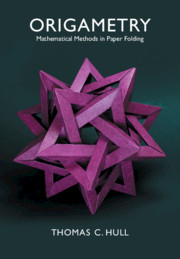Book contents
- Frontmatter
- Dedication
- Contents
- Introduction
- Part I Geometric Constructions
- Part II The Combinatorial Geometry of Flat Origami
- 5 Flat Vertex Folds: Local Properties
- 6 Multiple-Vertex Flat Folds: Global Properties
- 7 Counting Flat Folds
- 8 Other Flat-Folding Problems
- Part III Algebra, Topology, and Analysis in Origami
- Part IV Non-flat Folding
- References
- Index
8 - Other Flat-Folding Problems
from Part II - The Combinatorial Geometry of Flat Origami
Published online by Cambridge University Press: 06 October 2020
- Frontmatter
- Dedication
- Contents
- Introduction
- Part I Geometric Constructions
- Part II The Combinatorial Geometry of Flat Origami
- 5 Flat Vertex Folds: Local Properties
- 6 Multiple-Vertex Flat Folds: Global Properties
- 7 Counting Flat Folds
- 8 Other Flat-Folding Problems
- Part III Algebra, Topology, and Analysis in Origami
- Part IV Non-flat Folding
- References
- Index
Summary
Chapter 8 covers a variety of other mathematical problems that arise from flat origami.For example, how many times can you fold a piece of paper in half?This old question has a more interesting answer, discovered by a high-school student, than is commonly known.Can any shape be folded?Origami artists want to claim that the answer to this question is, “Yes,” but how should the question be formalized mathematically?And if we really can fold anything, how do we do so?The process of origami design can be quantified, and the ways in which complex origami designers do so to, say, create an origami insect are summarized.Another origami puzzle with a surprising answer is:If a square piece of paper is folded into a flat object, what is the biggest perimeter that object can have?Finally, we summarize the theory behind, and proof of, the famous Fold-and-One-Cut Theorem.
Keywords
Information
- Type
- Chapter
- Information
- OrigametryMathematical Methods in Paper Folding, pp. 159 - 178Publisher: Cambridge University PressPrint publication year: 2020
